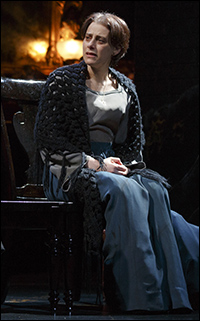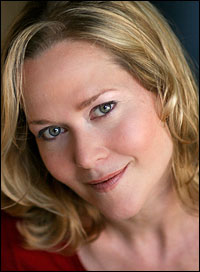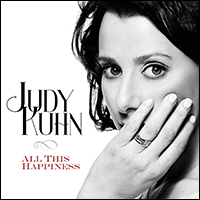
Passion [PS Classics]
I hesitated listening to the newest recording of Stephen Sondheim and James Lapine's Passion, this being the cast album of John Doyle's production at the Classic Stage Company. This is not because I don't like the score; I fell under its spell when the show opened at the Plymouth in 1994 — a minority opinion, at the time — and have championed it ever since. And not because I have a favorite Passion recording; the two prior English-language recordings, from Broadway and the 1997 London production, are equally enjoyable. Nor was my hesitation a reflection of my opinion of the CSC version, which I found the most effective Passion I've seen.
No, my problem with Passion is that I can't simply listen to it; I become immersed in it. I can happily sample a track or four of A Little Night Music or Follies (or, for that matter, She Loves Me or even Make a Wish); place it on pause; and either return later or start again another day. Listening to Passion, though, commands my attention. I am taken up by Sondheim's score as if caught by a spring storm in a ruined castle atop a craggy mountaintop. Don't move, don't stir; just sit there and experience it.
Nevertheless, I dutifully put on the new Passion so that I could at least start the review process, and found myself listening to the whole thing twice through. Seven times over four days, and "Is This What You Call Love?" is playing as I sit writing this. I am yet again in a Passion spell, and I hope to emerge by Wednesday. Maybe if I put on Mame or something.
| |
 |
|
| Kuhn in Passion. | ||
| photo by Joan Marcus |
| |
 |
|
| Rebecca Luker |
Judy Kuhn's Fosca, too, is a holdover from the Kennedy Center production. Kuhn was very good in 2002, but she seemed even better at CSC. Fosca has always been an odd bird, if you will; the actress playing the role is typically obscured to seem drab, ugly and sickly. Kuhn, at the CSC, added to this an "edge" which I don't recall from 2002. There is a harshness which suggests that Fosca's ill fortune was caused not only by her looks but to some extent by her personality. Donna Murphy gave an unforgettable performance in the original production, and Maria Friedman on the London cast album sounds like she must have been just as good. But Kuhn adds a new validity to the picture.
As for the male lead, Mr. Silverman, who was slated to play Maxim de Winter in the Rebecca that wasn't, was a revelation. Finally, someone made sense of the role, making Giorgio an equal to the two women tugging at his proverbial epaulets. (A few thousand New Yorkers had the privilege, two weekends ago, of hearing Silverman as the scenery-chewing Kodaly in the full-orchestra concert of She Loves Me at the Caramoor Festival. It turns out the man is funny, too!)
The recording has another hidden asset in Stephen Bogardus, as Colonel Ricci. I have always found Sondheim's stunning "Flashback" sequence to be the fulcrum of the score, radiating themes (and musical themes) in both directions. I can't say whether Bogardus — a fine singing actor — enhances it, or whether prior Ricci's simply haven't been allowed to stand out. When Bogardus gets hold of Sondheim's tortured waltz and starts singing that "the enemy was love," we get additional passion from Passion.
CSC used a reduced orchestra of nine pieces, which would normally suggest a severe musical loss. In this case, the new orchestration was done by Jonathan Tunick, who (of course) did the original. Cramped onto the side balcony with only 180-seats, the music perfectly filled the space. What's more, music director Rob Berman got full value from the orchestra and the all important singing ensemble. Passion sounded wonderful at CSC, and this carries over to the two-CD album. Okay, there is one musical moment that fails to replicate what they have in the full version: The climactic orchestral swell at the end of the "No One Has Ever Loved Me" scene. It's hard to do that with no harp and only one trumpet, I'm afraid. But that is a small, 15-second lapse, more than made up for by the passionate glories of this new recording of Sondheim's Passion.
| |
 |
|
| Cover art |
While awaiting the delayed Passion recording session, Judy Kuhn went into the studio to record an album of her own. "All This Happiness" is the title tune, paying homage to Passion. (The song is here merged with "In Buddy's Eyes," from Follies, which makes an interesting pairing.) Otherwise, the CD is low on show tunes. Rather, Kuhn gives us a collection that hits on pop, jazz, cabaret, blues and more, with arrangements by Dan Lipton leading a three-man band.
Highlights for me, besides the Passion song: "I Love the Way You're Breaking My Heart," an old-time song by Louis Alter and Milton Drake; "Something Cool," a very good café ballad by Billy Barnes that I don't recall having heard before; Cy Coleman & Carolyn Leigh's "The Best Is Yet to Come" and Randy Newman's "Losing You."
(Steven Suskin is author of "Show Tunes" as well as “The Sound of Broadway Music: A Book of Orchestrators and Orchestrations,” “Second Act Trouble,” the "Broadway Yearbook" series and the “Opening Night on Broadway” books. He can be reached at [email protected].)










